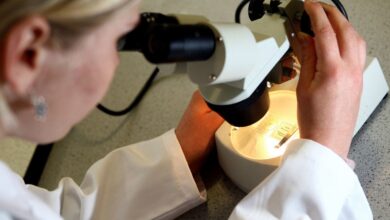Monkeypox: UK total up to 71 after new cases identified in England

The number of confirmed cases of monkeypox in the UK has risen to 71, after a further 14 infections were identified in England, health officials say.
Despite further cases being detected, the risk to the general population remains low, the UK Health Security Agency (UKHSA) said.
To date, no cases have been identified in Wales and Northern Ireland. One infection has been detected in Scotland, while 70 have now been reported across England.
UKHSA said a notable proportion of the cases identified to date have been among people who are gay and bisexual, adding that these groups should be alert to new rashes or lesions that form on any part of their body.
Dr Susan Hopkins, chief medical adviser at UKHSA, said: “We are continuing to promptly identify further monkeypox cases in England through our extensive surveillance and contact tracing networks, our vigilant NHS services, and thanks to people coming forward with symptoms.”
Those who suspect they may have symptoms have been encouraged by UKHSA to limit their contact with others and ring NHS 111 or visit their local sexual health service “as soon as possible”.
Nearly 20 countries where monkeypox is not endemic have reported outbreaks of the viral disease, with more than 100 confirmed or suspected infections detected, mostly in Europe.
The World Health Organisation has described the sudden increase in cases as “atypical”, but said the outbreak remains “containable” and limited. The fact that cases are being seen in so many different countries suggests the disease may have been silently spreading for some time, the agency said.
Monkeypox is usually found in West Africa, and the virus does not tend to spread easily between people. The illness is usually mild and those who are infected with the virus typically recover in a matter of weeks.
Symptoms include fever, headache, muscle aches, backache, swollen lymph nodes, chills and exhaustion. A rash can develop, often beginning on the face, which then spreads to other parts of the body including the genitals.
The first case identified in the UK was in a person who had returned from Nigeria, but other cases are unrelated to travel.
Sir Jeremy Farrar, the director of the Wellcome Trust, said “we have never seen anything like this before, with such a number of cases” in so many countries.
Speaking on Monday, he told BBC Radio 4’s Today programme that there have been small outbreaks in the past, with cases recorded in the UK, but “this is different, something has changed” and suggested superspreader events could be responsible.
“The virus may have changed, but I think that’s unlikely,” Sir Jeremy said. “More likely is, I think, that the niche that this virus now finds itself in has allowed for some superspreader events and those individuals involved in that have then travelled to other parts of the world and taken the infection with them.”
A leading adviser to the WHO similarly described the outbreak of cases as “a random event” that might be explained by two recent mass events in Europe.
Dr David Heymann, who formerly headed WHO’s emergencies department, said the leading theory to explain the spread of the disease was sexual transmission – and the close contact that it brings – among gay and bisexual men at two raves held in Spain and Belgium.
“We know monkeypox can spread when there is close contact with the lesions of someone who is infected, and it looks like sexual contact has now amplified that transmission,” said Dr Heymann.
That marks a significant departure from the disease’s typical pattern of spread in central and western Africa, where people are mainly infected by animals like wild rodents and primates and outbreaks have not spread across borders.
The disease can be fatal in about 10 per cent of infections, but no deaths have been reported among the current cases.





